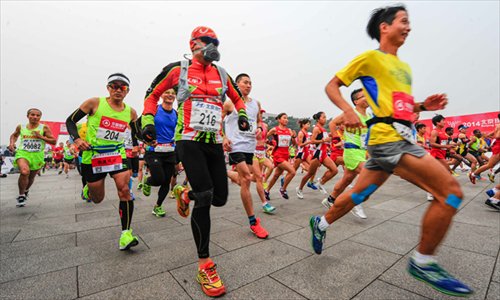

Runners take part in the 2014 Beijing Marathon on Sunday. Photo: Cui Meng/GT
After the high-profile Beijing Marathon went ahead Sunday morning despite the heavy levels of smog in the city, concerns have been raised about the participants' health and whether the race should have been suspended.
Some 30,000 were registered to run in the main event and the half marathon. Many showed up at the starting line in the iconic Tiananmen Square wearing face masks, and many dropped out altogether.
In the elite competition, Girmay Birhanu Gebru and Fatuma Sado Dergo led the Ethiopians to victory, who swept one-two on the podiums for the men's and women's races.
Beijing Meteorological Bureau forecast the heavy smog Saturday, and the Beijing Marathon Organizing Committee published a guideline on its official Sina Weibo and WeChat accounts Saturday night, saying that they had made precautions to deal with the smog.
Race organizers said that Beijing health authorities planned to send two additional ambulances and two more paramedic teams to the finish line at the National Stadium and also add oxygen equipment as well as anti-asthma medication in the four ambulances accompanying participants.
They suggested that elderly runners and runners with respiratory conditions should think twice before joining the race.
Despite the precautions, some runners withdrew from the marathon out of pollution concerns. Race organizers did not disclose Sunday the number of runners who did not race or who pulled out before the finish line.
Lei Zongyang, 26, who works at a language center in Beijing, had previously run five marathons and had prepared for this marathon since February. He decided he would not race, fearing that the pollution might reduce his running life.
"I struggled for one hour this morning watching the pollution index climbing from 300 to 400 [PM2.5], and finally decided to quit," Lei said.
"I can run in the next marathon. Why risk my life for this one?" he said.
As the race started at 8 am, the PM2.5 index (particulate matter less than 2.5 microns) showed 405.
Many more struggled but still decided to run.
Zhang Chongwei, a local Beijing runner and also an employee from Beijing Meteorological Bureau, said that he has accepted the fact that Beijing's air condition will not improve in the short-term.
"As a weatherman, I would say please reduce outdoor activities in such weather, but people still have to go to work," Zhang said.
Some who did race posted before-and-after pictures of their dirty face masks on social networking sites, and some said they suffered from different symptoms, such as dry throats. Others said they had black particulates inside their nose.
The Beijing Marathon was not the only international sporting or entertainment event that was affected by Beijing's heavy smog this autumn.
Top tennis stars were forced to play in hazardous smog for many days during the China Open this September and early October. Several high-profile cyclists pulled out of the Tour of Beijing and the second stage on October 11 was cut short due to heavy pollution with riders complaining of breathing problems. The four-year race contract was not renewed. Several football players suffered from dry throat and breathing difficulties during training for the Super Clasico de las Americas between Argentina and Brazil on October 11.
Mariah Carey held her first Beijing concert in smog-choked conditions at the Workers' Stadium on October 10. The venue was only at 40 percent capacity as the audience stayed away due to the smog, the Beijing Evening News reported.
After the series of smog-affected events, there were many online calls for the Beijing Marathon to be suspended.
Some argued that by running, it shows that people want to lead healthy lifestyles, but under such polluted conditions, running would be adverse to their health.
Wang Dawei, vice-president of the organizing committee, said they did not postpone the race as around 46 percent of the competitors had journeyed from outside Beijing, so it would be a big "challenge" for those people and the organizers if the marathon were rescheduled at the last minute.
An employee from the organizing committee, who asked to remain anonymous, told the Global Times on Sunday that many municipal departments were involved in coordinating the event, and changing the schedule would be difficult.
But the public still accused the organizers of not prioritizing the runners' health.
Experts shared the same concerns, saying that international events organized in polluted air conditions not only give a negative image of the country to the world, but are also irresponsible to participants and spectators' health.
"China's pollution has been put on the front pages of Western media outlets, which has already seriously affected China's image," Guo Wanxin, assistant director of Tsinghua University's New Economy and New Industries Research Center, told the Global Times.
"It's like satire that people are wearing masks to run the marathon, for China's environmental protection authorities, as these images could cause more losses to China than canceling an event," Guo said.
"China can leave a better impression on the world if the sponsors and organizers call a suspension if the air is polluted," Wei Xiao'an, secretary-general of the China Tourism Leisure Association, told the Global Times.
Bus, ferry services affected by marathon
2014-10-17World‘s ‘happiest‘ run kicks off in Shanghai
2014-09-28City’s craze for running in race to keep fit
2014-09-25Copyright ©1999-2018
Chinanews.com. All rights reserved.
Reproduction in whole or in part without permission is prohibited.